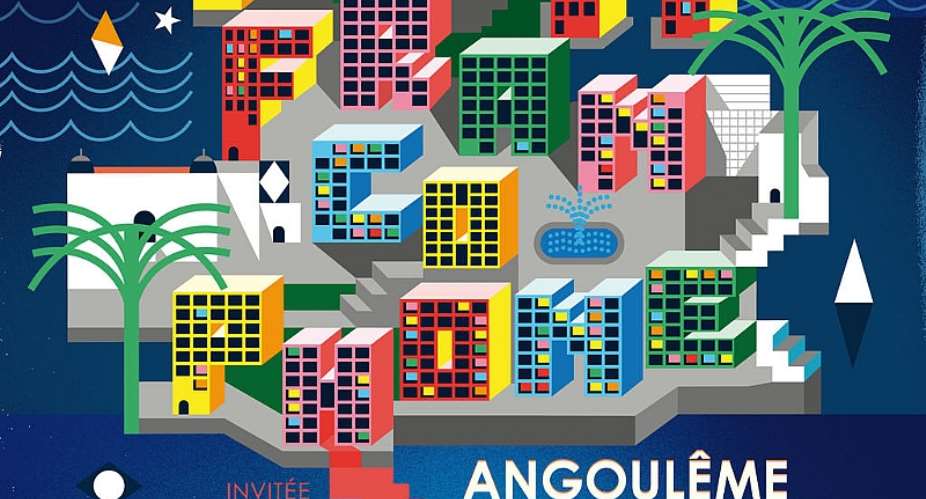The 13th French film festival in Angoulême gets underway on Friday until 2 September, with 20 entries angling for ten Valois awards. In addition to the screenings is an exhibition in honour of Lebanese artists – sponsored by the Institut du Monde Arabe - part of a cultural tribute to Beirut following the deadly explosions on 4 August.
The 2020 edition of the Festival du film Francophone d'Angoulême (FFA) will be unlike any of the previous 12 editions, due to the exceptional circumstances brought about by the coronavirus pandemic.
The festival is going ahead, despite having to impose strict health measures on visitors, which is "not an easy task," concludes Marie-France Brière, co-founder of the festival alongside Dominique Besnehard.
"The health restrictions will be applied to the letter," the organisers told French daily Le Figaro, referring to the need for visitors to reserve their tickets online, wear a mask at all times, and leave every second seat vacant.
"The artists invited as special guests will have to wear a mask too, when in the cinema, and during photocalls," Brière said.
Among the guests on opening night will be French prime minister Jean Castex, and Culture minister, Roselyne Bachelot, keen to show they are supporting a sector which has been particularly hard hit since March.
Instead of goody bags, luxury brand LVMH is to hand out masks, Puressential will take care of the hand gel and several mobile Covid testing centres will be set up during the week-long event.
Springboard to international scene
Ten feature films and ten short films are in the running for one of the 'Valois' awards, which range from the Diamond Valois to best actress and actor via best scenario and music.
The public also have their pick of an award, while students get their own jury.
Among this year's crop is Petit Pays, (Small country) directed by Eric Barbier, based on an award-winning novel by Gaël Faye, recounting the horrors of the Rwandan genocide seen through the eyes of a young boy.
The 7 member jury is presided over by actor-directors Benoît Delépine and Gustave Kervern, whose joint film Effacer l'historique (Delete search history) is the opening film in the preview category.
Considered a stepping stone to conquering the French-speaking public, before moving into the arena of the international festival circuit, the FFA prides itself on being a 'popular' event, with films appreciated by critics and public alike.
Solidarity with Lebanon
This year, cofounder Marie-France Brière is proud to add an extra something to the festival – a tribute to Lebanese artists, featuring works by Shafic Abboud, Assadour, Hussein Madi and François Sargologo.
This as a sign of support from the cultural sector following the massive blasts in Beirut on 4 August which saw more than 200 killed and thousands injured or homeless, and a city left in ruins.
Highlighting the close ties between France and Lebanon, Brière reached out to her artist friends and collectors Claude and France Lemand, who had already donated a substantial collection of works to Institut du monde arabe in Paris (IMA) in 2018.
Together, they set about organising an exhibition for the duration of the festival, and a fundraiser screening of the film Capharnaüm by Nadine Labaki, on 31 August, hosted by Jack Lang, former French minister for Culture, and now president of the IMA.
City of light
Claude Lemand, born in Lebanon, Parisian by adoption, jumped on the occasion. He was one of the first gallery owners to promote Arab world artists in Europe.
"I was so happy to see that we (the festival) shared the same universal human values," he enthuses.
"This exhibition will, I hope, get media attention in France and Lebanon, and further a field, thanks to the charisma of Jack Lang," he told the press.
"This initiative is just another one of the many undertaken by the IMA and its president and others in the arts world, to express solidarity with the people of Beirut...It's a way of showing the city in a more positive light."





 Former Kotoko Player George Asare elected SRC President at PUG Law Faculty
Former Kotoko Player George Asare elected SRC President at PUG Law Faculty
 2024 elections: Consider ‘dumsor’ when casting your votes; NPP deserves less — P...
2024 elections: Consider ‘dumsor’ when casting your votes; NPP deserves less — P...
 You have no grounds to call Mahama incompetent; you’ve failed — Prof. Marfo blas...
You have no grounds to call Mahama incompetent; you’ve failed — Prof. Marfo blas...
 2024 elections: NPP creates better policies for people like us; we’ll vote for B...
2024 elections: NPP creates better policies for people like us; we’ll vote for B...
 Don’t exchange your life for wealth; a sparkle of fire can be your end — Gender ...
Don’t exchange your life for wealth; a sparkle of fire can be your end — Gender ...
 Ghana’s newly installed Poland train reportedly involved in accident while on a ...
Ghana’s newly installed Poland train reportedly involved in accident while on a ...
 Chieftaincy disputes: Government imposes 4pm to 7am curfew on Sampa township
Chieftaincy disputes: Government imposes 4pm to 7am curfew on Sampa township
 Franklin Cudjoe fumes at unaccountable wasteful executive living large at the ex...
Franklin Cudjoe fumes at unaccountable wasteful executive living large at the ex...
 I'll 'stoop too low' for votes; I'm never moved by your propaganda — Oquaye Jnr ...
I'll 'stoop too low' for votes; I'm never moved by your propaganda — Oquaye Jnr ...
 Kumasi Thermal Plant commissioning: I pray God opens the eyes of leaders who don...
Kumasi Thermal Plant commissioning: I pray God opens the eyes of leaders who don...
